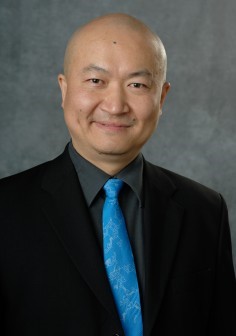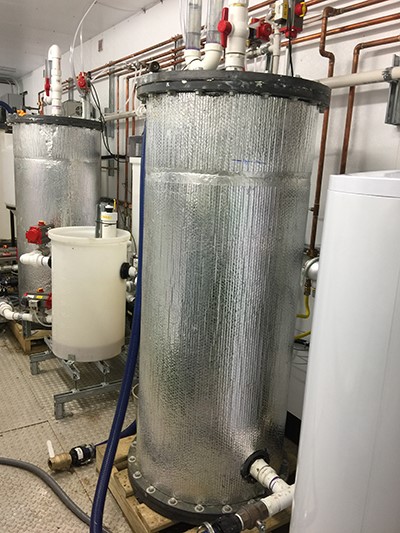MSU and U.S. Army work to improve wastewater treatment facilities on military bases
The $1.3 million grant was awarded to Michigan State University and the U.S. Army to convert blackwater and organic food wastes into potable water and renewable energy.

Michigan State University and the U.S. Army Combat Capabilities Development Command Ground Vehicle Systems Center (CCDC GVSC) are working together to develop a robust, energy-positive wastewater treatment system for Army Forward Operating Bases (FOBs).
The project is using a $1.3 million grant to convert blackwater and organic food wastes into potable water and renewable energy. Funding is from the U.S. Department of Defense (DOD) Environmental Security Technology Certification Program (ESTCP).
Leading the team at MSU is Wei Liao, a professor of biosystems and agricultural engineering and director of the MSU Anaerobic Digestion Research & Education Center (ADREC). James Dusenbury, a senior technical expert and environmental engineer, will serve as the principal investigator at Army CCDC GVSC.

Co-Principal Investigators are Tim Hogan, professor of electrical and computer engineering, and Benjamin Thomas, an environmental engineer at Army CCDC GVSC.
The project will build on MSU’s 10 years of waste and wastewater research at ADREC.
“Wastewater treatment is a significant logistical burden for FOBs that have a high cost, both financially and with respect to risk to the soldier,” Dusenbury said. “FOBs currently have wastewater hauled off or process it using burn-out and chemical latrines, sewerage lagoons, septic systems and leach fields – none of which are operationally effective, nor environmentally friendly.”
“Wastewater, particularly blackwater, and organic wastes, like food leftovers, contain a lot of energy. We can take them and turn environmental and health liabilities into renewable energy that will help to sustain the bases,” Dusenbury added.
Liao said the new system will integrate solar, biological, electrochemical, thermoelectric, and membrane technologies that not only reclaim water, but also provide enough on-site energy generation to sustain FOBs without using external fossil fuels.
“This robust and energy-positive treatment system will provide an all-new concept for FOBs to sustainably treat waste streams, reclaim water on-site, and generate renewable energy,” Liao explained. “It will extend wastewater treatment technology beyond military operations, from fixed facilities to distributed systems, for both municipal and agricultural applications.”

MSU ADREC finds sustainable solutions to convert organic residues into resources. Research develops novel waste-to-resource technologies to convert organic wastes into value-added fuel and chemical products. It also fulfills commercialization and technology transfer of new waste-to-resource concepts, and educates the next generation of engineers, scientists and policymakers on waste utilization design and practice. ADREC has successfully set up solar-biopower systems in rural Central America and anaerobic digestion units at the Detroit Zoo.
The U.S. Army CCDC GVSC is the nation’s laboratory for advanced military automotive technology. The Force Projection Technology (FPT) Business Area is the U.S. Department of Defense lead laboratory for ground based tactical water supply and wastewater treatment. FPT conducts research, development and engineering support for the Army’s mobile water purification, distribution, storage, monitoring and wastewater reuse and treatment systems. (Distribution A. Approved for public release; distribution unlimited. OPSEC3867)



 Print
Print Email
Email



